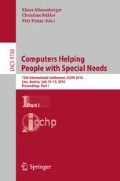Abstract
The study goal was an investigation into the efficacy of tablets as teaching tools for students with learning difficulties attempting to study concepts in geometry. The study includes three students studying in a fifth grade regular class, whose achievements in geometry fell below class average. The quantitative analysis was based on Single Subject Design that was based on Multiple Baseline Design. Findings indicates a rise in achievements in each student as they began using tablets. Analyzing of multiple baseline data reveals a great degree of baseline variation without tablets, and more moderate and stable variation during intervention. The use of tablets allowed the students accessibility to challenging material, and to initiate each class differently.
Access this chapter
Tax calculation will be finalised at checkout
Purchases are for personal use only
References
Morgan, P.L., Farkas, G., Wu, Q.: Five-year growth trajectories of kindergarten children with learning difficulties in mathematics. J. Learn. Disabil. 42(4), 21–306 (2009)
Learning, S.: Teaching students with reading difficulties and disabilities: a guide for educators. www.education.gov.sk.ca/reading-difficulties-disabilities
Buffum, A., Mattos, M., Weber, C.: Pyramid response to intervention. In: RTI, Professional Learning Communities, and How to Respond When Kids Don’t Learn. Solution Tree, Bloomington (2009)
Fuchs, D., Fuchs, L.S.: Rethinking service delivery for students with significant learning problems developing and implementing intensive instruction. Rem. Special Educ. (2014). doi:0741932514558337
Ochsendorf, R: What Have We Funded? A Summary of Mathematics Research. The National Center for Special Education Research. https://ies.ed.gov/ncser/pdf/Math_2015.pdf
Frey, N., Fisher, D., Gonzalez, A.: Teaching with Tablets: How do I integrate tablets with effective instruction?. (ASCD Arias) ASCD, Alexandria (2013)
Haas, M.: Teaching methods for secondary algebra: A meta-analysis of findings. NASSP Bull. 89(642), 24–46 (2005)
Horner, R.H., Carr, E.G., Halle, J., McGee, G., Odom, S., Wolery, M.: The use of single-subject research to identify evidence-based practice in special education. Except. Child. 71(2), 165–179 (2005)
Barlow, D.H., Nock, M.: Single case experimental designs: Strategies for studying behavior for change, 3rd edn, pp. 209–251. Pergamon, New York (2008)
Byiers, B.J., Reichle, J., Symons, F.J.: Single-subject experimental design for evidence-based practice. Am. J. Speech-Lang. Pathol. 21(4), 397–414 (2012)
Gioia, G., Ispuith, P., Guy, S., Kenwirthy, L.: BRIEF: Behavior Rating Inventory of Executive Function – Professional Manual. Psychological Assessment Resources Inc. (PAR), Lutz (2002)
Author information
Authors and Affiliations
Corresponding author
Editor information
Editors and Affiliations
Rights and permissions
Copyright information
© 2016 Springer International Publishing Switzerland
About this paper
Cite this paper
Shrieber, B., Eldar, D. (2016). Efficacy of Tablets for Students with Learning Difficulties Studying Concepts in Geometry. In: Miesenberger, K., Bühler, C., Penaz, P. (eds) Computers Helping People with Special Needs. ICCHP 2016. Lecture Notes in Computer Science(), vol 9758. Springer, Cham. https://doi.org/10.1007/978-3-319-41264-1_65
Download citation
DOI: https://doi.org/10.1007/978-3-319-41264-1_65
Published:
Publisher Name: Springer, Cham
Print ISBN: 978-3-319-41263-4
Online ISBN: 978-3-319-41264-1
eBook Packages: Computer ScienceComputer Science (R0)

